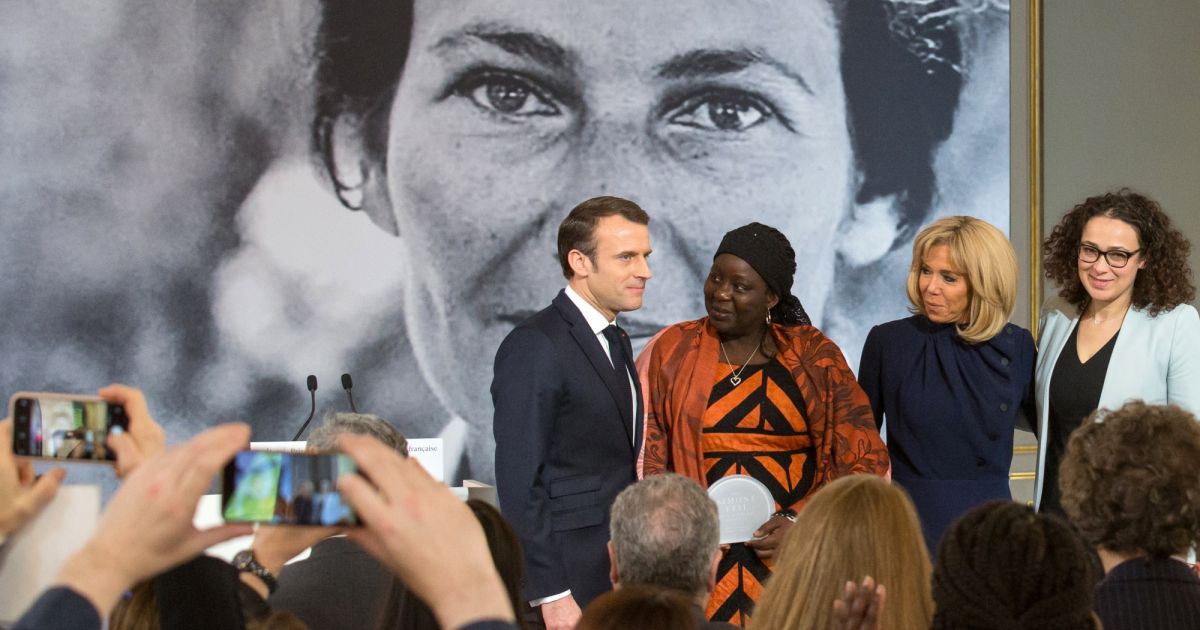A Cameroonian activist, Aissa Doumara Ngatansou, has been awarded the inaugural Simone Veil Prize of the French Republic for her organization that helps victims of rape and forced marriages in her home country.
The French president, Emmanuel Macron, presented the prize to Ngatansou on International Women’s Day at a ceremony at the Elysée Palace in France, reports France24.
46-year-old Ngatansou dedicated the prize to all the women victims of violence and forced marriages, as well as, the survivors of the Nigerian insurgency group Boko Haram, whose activities have spread to Cameroon.
Ngatansou was speaking in front of a large portrait of Veil, the revered French politician and Holocaust survivor who championed women’s rights

Veil survived the Nazi death camp at Auschwitz and defied institutional sexism to push through a law legalising abortion in France before her death in 2017 at the age of 89.
The Simone Veil prize is worth $112,000.
Macron praised Ngatansou for “her commitment of over 20 years in the service of women, carried out in silence, sometimes in disapproval.”
“This is an example of courage, of challenging the weight of legacies,” he said.

Purepeople
Macron added that France would give 120 million euros ($135 million) to a fund to support the fight against violence and discrimination inflicted on women around the world.
He said measures will be taken to educate young girls, particularly, those in the Sahel region, with the establishment of a bank to support women in business across Africa. Paris also proposed to host a global women’s conference next year, 25 years after the one held in Beijing in 1995.
More about Aissa Doumara Ngatansou

The Cameroonian activist co-founded a branch of the Association for the Elimination of Violence Against Women (ALVF) in the city of Maroua in 1996.
ALVF works with survivors, and advocates with decision-makers to end early and forced marriages and other forms of gender-based violence.
ALVF has been providing relief, livelihood and psychosocial support to women and girls affected by the Boko Haram insurgency in the region, with the support of UN Women.
Growing up, Ngatansou lost her mother when she was 11. By 15, her father and his family had married her off to a man without her consent.
“That was when I realized that I had to do something for myself. My own experience of discrimination inspired me to become the activist that I am today,” she was quoted by UN Women last November.
She said that after getting married, she decided to continue with her studies despite the disapproval of her husband’s family. Ultimately, her husband started giving her the needed support.
After high school, she worked with other women to start their association in Maroua to support women and girls experiencing violence. Some of the victims include the uneducated and other educated people in influential positions in society who are usually ashamed to seek help in public.
“After counselling them, I refer them to the social worker or the gender desk for more services.”
But her work has not been without challenges, as she and her colleagues tend to deal with attacks and court cases from families of the girls they are protecting. Largely being a patriarchal society, religious leaders even join in attacking Ngatansou’s work.
As rape of young girls and child marriage continue to be major challenges in a country that has often come under attack from Boko Haram, Ngatansou is hoping that the government would intervene and enforce existing laws that deal with perpetrators of gender-based violence.
Together with her colleagues, Ngatansou’s association would also continue to sensitize women, families, traditional and religious leaders on gender-based violence.









